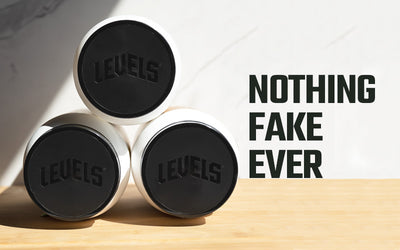A study from 2009 suggests that creatine raises DHT levels, which may cause hair loss.
Male pattern baldness, also called androgenic alopecia, affects up to 50% of adult men[*].
And considering that hair loss treatments are a $4 billion per year industry in the United States alone, it’s safe to say that people take this aspect of their appearance seriously[*].
But should you avoid creatine supplements if you’re concerned about your hairline?
In this article, you’ll learn what science says about creatine and balding, plus other research-backed insights about male and female hair loss.
What is Creatine?
Creatine is an extremely popular sports supplement proven to enhance athletic performance for men and women.

And it’s also a naturally-occurring compound in your body that contributes to energy production during physical activity.
It works by helping to regenerate adenosine diphosphate (ADP) back into adenosine triphosphate (ATP) while you’re active[*].
Creatine increases the energy available to your muscles during strenuous activity, which enables you to generate more force as you exercise.
As a result, taking creatine results in the ability to sustain power output for longer[*][*].
Impressively, over 500 studies support the safety and effectiveness of creatine supplements for virtually everyone[*].
However, for men who are worried about hair loss, one study in particular has generated concerns.
Keep reading to learn why some people worry about creatine and balding.
Creatine and Hair Loss: What Research Says
In 2009, a three-week-long randomized controlled trial examined the effects of creatine supplementation in 20 adult male rugby players[*].
The study included a one-week-long loading phase where the athletes took 25 grams of creatine daily, followed by a two-week “maintenance” phase of 5 grams per day of creatine.
And one finding was that in men given creatine, levels of a hormone called dihydrotestosterone (DHT) increased by about 56% on average during loading, then remained 40% above baseline levels during the maintenance period.
DHT is an androgenic hormone that occurs naturally in men. Among other effects, it can increase strength and power, which led the researchers to speculate that elevated DHT levels might play a role in some of creatine’s performance-boosting effects.
But scientists think that DHT plays a role in male hair loss, also called male pattern baldness (MPB) or androgenic alopecia (AA)[*].
Although the study didn’t measure hair loss in the rugby players, the study findings have led some non-scientists to speculate that creatine supplements might cause hair loss in men.
Putting Creatine and Hair Loss Into Perspective
Are you concerned about your DHT levels and the possibility of hair loss? Even if you are, you probably shouldn’t toss your creatine out just yet.

First of all, the 2009 creatine study was far from comprehensive. Keep the following facts in mind:
- The study was only three weeks long, with a small sample size
- Researchers were not investigating hair loss directly
- Although the DHT findings were statistically significant, the study does not prove that taking creatine was what caused elevated DHT levels in the athletes
- The researchers did not propose a mechanism by which creatine might raise DHT
- No other scientists have replicated the same results since the original study
But perhaps most importantly, a possibility exists that the increased DHT levels were due to another factor: steroid contamination.
For example, a 2017 review from the journal Nutrients found that around 15-25% of common sports supplements, including creatine, may contain “low levels of contaminating steroids”[*].
The 2009 creatine study authors did not list where they obtained their creatine, nor did they test it for contamination. So unfortunately, there’s no way to know for sure whether the supplements were tainted.
To sum up, the study introduces more questions than answers. In truth, it doesn’t demonstrate that creatine increases DHT levels, let alone that creatine causes hair loss.
The Facts About Creatine, DHT, and Your Hairline
If uncontaminated creatine does raise DHT, then it might contribute to hair loss in a minor fashion.
But before you swear off creatine forever, consider these facts.
To begin with, DHT already exists in your body naturally.
Some research predicts that by age 30, 30% of men will experience male pattern baldness whether or not they take androgenic-anabolic steroids (AAS), creatine, or other supplements (contaminated or not) that might affect DHT levels[*].
And the number increases to 50% by age 50[*].
Men have higher DHT levels than women, and as an androgen, it plays a role in the development of “manly” traits including deeper voices, higher strength, stronger bones, increased muscle mass and hardness, and penile erections[*][*].
Therefore, like most hormones, DHT is not inherently “good” or “bad.” Low DHT levels may even lead to problems like erectile dysfunction, which is why trying to prevent hair loss by lowering DHT can have undesirable sexual side-effects in men[*].
In other words, if you’re stressed about the prospect of a receding hairline or a bald spot, creatine is just one minor, totally unproven factor in the grand scheme of your hormone levels.
Further, some men without a genetic tendency towards baldness are resistant to balding, no matter how high their androgen levels become[*].

If you’re not predisposed to going bald, taking creatine definitely won’t raise your risk of baldness. And if you do have a propensity towards baldness, there’s a small chance creatine could accelerate the process, but no one knows for sure.
Creatine and Female Hair Loss
Hair loss is fairly normal for men, but less than 20% of women experience hair loss during their lifetimes[*].
Women have lower levels of testosterone and DHT compared to men, so hormonal hair loss is uncommon. And when it does occur, it may be due to a medical condition like polycystic ovary syndrome (PCOS) or hyperthyroidism[*].
Therefore, creatine is even less of a hair loss concern for women than for men. Even if creatine does increase DHT conversion (which is unproven), a typical, healthy woman doesn’t have enough circulating testosterone to convert to significant amounts of DHT.
Additionally, women’s hair loss can also occur due to non-hormonal conditions like alopecia areata, a type of autoimmune hair loss that affects about 2% of women[*].
For both men and women, investigating options proven to slow or stop hair loss is a better use of time as opposed to avoiding creatine.
The Most Effective Treatments for Hair Loss
Most of the treatments shown to be effective for hair loss are drugs. Some are available over-the-counter, while others are prescription-only.
According to peer-reviewed research, these are the most effective ways to deal with hair loss:
- Over-the-counter topical minoxidil (Rogaine) solution may help stop or reverse balding by increasing scalp blood flow[*]
- Prescription 5-alpha-reductase (5AR) inhibitors like finasteride (Propecia) and dutasteride (Avodart) prevent your body from creating DHT, but are associated with side-effects like sexual impotence[*]
- Over-the-counter topical ketoconazole (Nizoral) shampoo 1-2% may blocks the effects of DHT topically[*]
- Infrared light therapy, also called photobiomodulation (PBM) or low-level laser therapy (LLLT) appears promising in some studies for hair regrowth[*]
- Hair transplants and other surgeries are widely available, but are expensive and vary significantly in quality
But if you decide to treat your hair loss, it’s wise to talk to your doctor first, especially if you have a medical condition, already take medication, or are a senior citizen.
Also, women experiencing hair loss should talk to a doctor as soon as possible. Hair loss in women can point to a serious medical issue like PCOS or hyperthyroidism.
On the other hand, balding is natural for many men, and it could even have some benefits on how others perceive you.
Notably, a 2013 study from the journal Social Psychological and Personality Science found that men and women rated shaved bald men in photos as being “more dominant, taller, and stronger”[*].
But if you would prefer not to sport a “mature hairline” or rock the shaved bald look, at least you’ve got options.
The Bottom Line: Does Creatine Cause Hair Loss?
Although one small, short-term study found that creatine elevated DHT levels, that study didn’t demonstrate any effect on hair loss.
The results may have occurred due to a fluke or contaminated supplements, and no one has ever replicated them.
If you’re a man who’s extremely concerned about androgenic alopecia, perhaps you’ll choose to avoid creatine out of an abundance of caution.
However, keep in mind that a variety of factors influence hair loss, and about half of men will lose some of their hair by age 50.
At the end of the day, your decision to take creatine or not probably won’t have a significant effect on your risk of balding.
- Are you new to creatine supplementation? Read How & When to Take Creatine (Plus 4 Reasons to Take It).
- Or, if you’re looking for faster results from creatine, check out Creatine Loading: How To Do It and Is It Necessary?
- And, if you want to learn about other types of creatine, read Creatine HCL vs. Monohydrate: Cutting Through the Hype.







